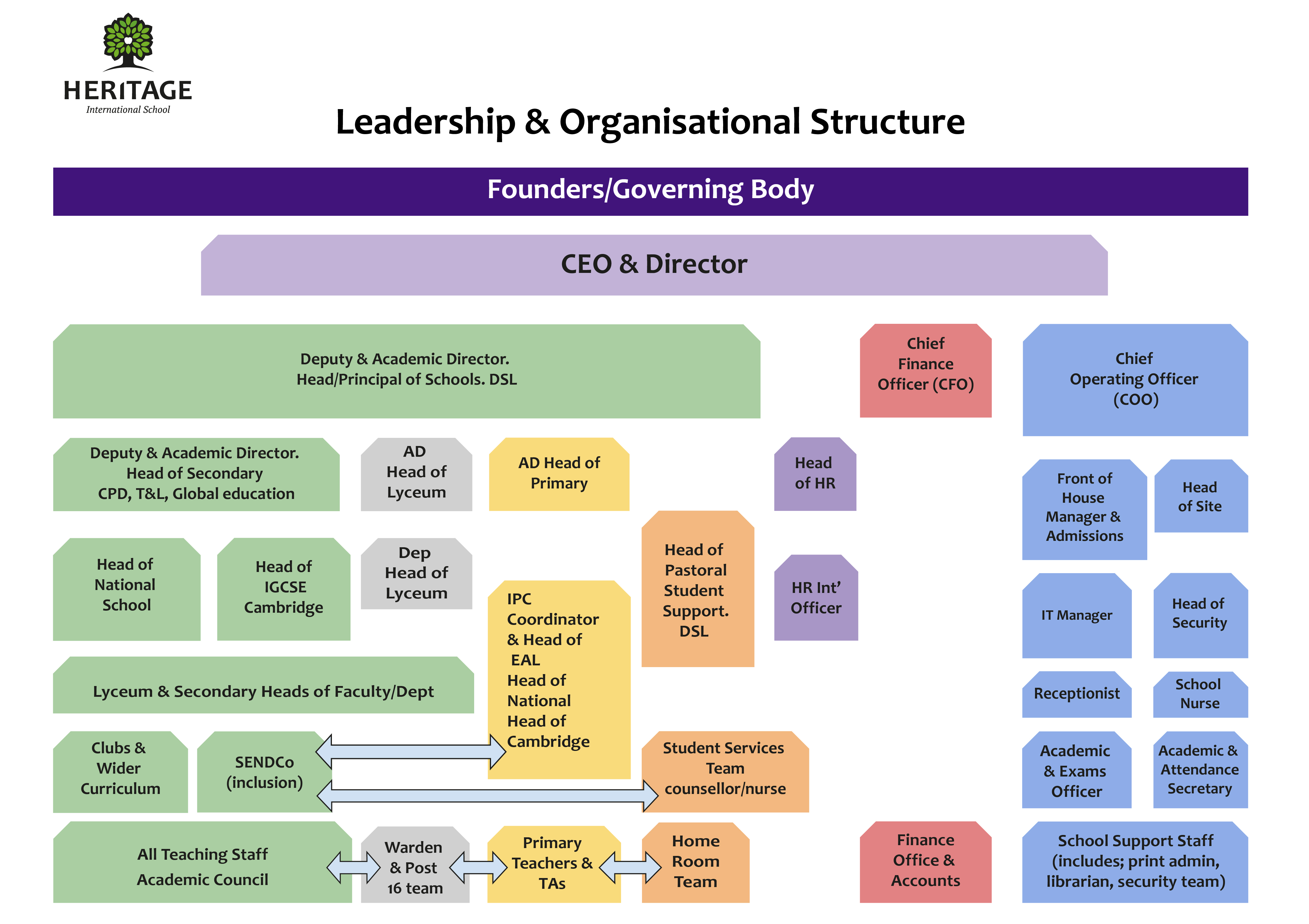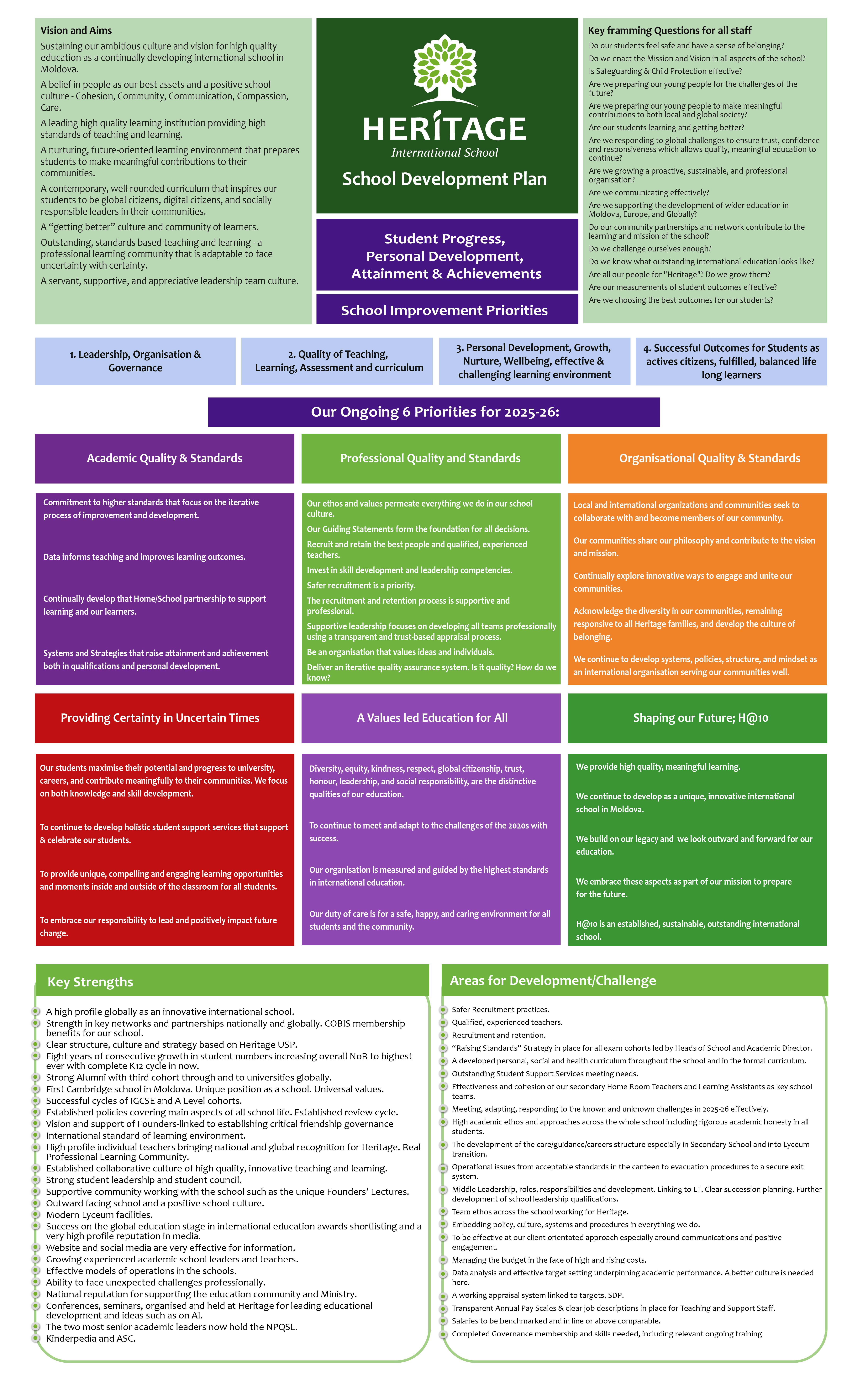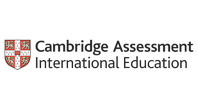At Heritage International School, we value a strong and well-structured governance. We believe this provides a confident and solid strategic leadership, which leads to robust accountability, oversight and assurance for educational and financial performance.
In our vision, the governance board of the school has the following core functions:
- Ensure clarity of vision, ethos and strategic direction
- Holds executive leaders to account for the educational performance of the organization and its pupils, and the effective and efficient performance management of staff
- Oversees the financial performance of the organization and makes sure its money is well spent.
Heritage International School’s governance board is composed as following:
- Chair of the Board (governance oversight of Safeguarding and Wellbeing)
- Vice Chair of the Board (oversight for OH&S)
- Director (Head)
- Academic Director (Dep Head)
- Chief Operating Officer
- Chief Finance Officer
- Heads of School (Deputy Child Protection Officers)
- Head of HR
- Psychologist (Child Protection Officer – DSL)
- Parent Representatives
- Clerk and members representing each of the committees held by people in diverse sectors: business, academia, government, an embassy, international development, the health sector, and/or community leaders.
- Student Representatives

The role of Heritage Board stands in ensuring that our school is responsive and collaborative to the priorities and values of our community.
1. Understanding School Mission, Vision, and Strategic Goals
The board adopts a clear statement of the school’s mission, vision and strategic goals, and establishes policies and plans consistent with the mission statement. In this regard, the board recognizes that its primary work and focus are long-range and strategic.
2. Representing the School Appropriately and Accurately
Board members actively support, promote, and understand the school’s mission, vision, strategic goals and policy positions. In this regard, the members are knowledgeable about the school’s mission and goals, and policy positions, including commitment to equity and justice, and representing the school appropriately and accurately within the community.
3. Develop/Review Bylaws and Develop/Maintain systems that align with legal requirements
The board reviews and maintains appropriate bylaws that conform to legal requirements, including duties of loyalty, obedience, and care. Accordingly, the board members assure that the school and board operate in compliance with applicable laws and regulations, minimizing exposure to legal action.
4. Maintaining a solid relationship between Board and school director
The board engages proactively with the head of school in cultivating and maintaining good relations with school constituents, as well as the broader community and exhibits best practices relevant to equity and justice. The board undertakes formal strategic planning on a periodic basis, sets annual goals related to the plan, and conducts annual written evaluations for the school, the head of school, and board itself.

5. Keeping control of the financial future of the institution
The board engages in strategic financial planning, assuming primary responsibility for the preservation of capital assets and endowments, overseeing operating budgets, and participating actively in fundraising. The board selects, supports, nurtures, evaluates, and sets appropriate compensation for the head of school/School Director.
One of the major ways for the board to support the head is by conducting a written evaluation of his/her performance every year.
6. Committing to Quality and Growth
The board is committed to a program of professional development that includes annual new-advisory board orientation, ongoing education and evaluation, and advisory board-leadership succession planning. The board keeps full and accurate records of its meetings, committees, and policies and communicates its decisions widely while keeping its deliberations confidential. The board works to ensure all its members are actively involved in the work of the board and its committees. Once a decision has been made, the board speaks with one voice. Board Officers and Advisors keep all board deliberations confidential, and guards against conflict of interest, whether personal or business-related.
7. Organizing the effective board and adding value to the school
The board keeps full and accurate record of its meetings, committees, and policies and communicates its decisions widely, while keeping its deliberations confidential.
Complaints are dealt with under our Complaints procedure, outlined in our policy. A complaint directly against the Director (Head) is managed by the Chair following the procedure in the school policy.
At Heritage International School, the Chair, with support from the Vice Chair, is responsible for ensuring the effective functioning of the board and has a vital role in setting the highest of expectations for professional standards of governance. It is the chair’s role to give the board clear leadership and direction, keeping it focused on its core function. The chair always encourages the board to work together as an effective team, building their skills, knowledge and experience.
Heritage board’s meetings focus on issues that further the school's mission and vision, including evaluation of current policies and assessing the performance of the school, the head, and the board itself.
Heritage’s board meetings take place once in three months.















